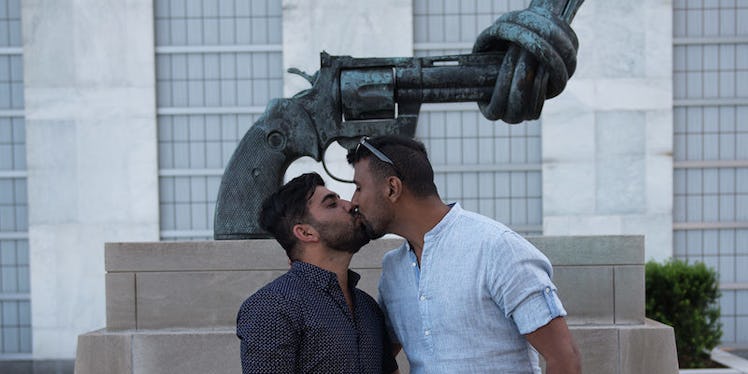
This Story About A Gay Iraqi Couple Will Move You To Help Other Refugees
Nayyef Hrebid and Btoo Allami fell in love at first sight.
There was just one giant problem: They were in Iraq, where they could be violently persecuted for being gay.
They met in 2004, when Hrebid was working as a translator for the American army and Allami was serving in the Iraq military. The couple carried on their secret romance in Iraq for years.
But then, people started targeting translators like Hrebid. On top of the threat of being discovered for being gay, Hrebid knew he had to leave in 2009.
He was able to get asylum in the US fairly quickly due to his work with the American military. But it wasn't so easy for Allami to get to Hrebid in the United States.
Their story is told in the documentary "Out Of Iraq," which premiered on Logo this month. It's being shown again on the channel on Saturday night at 9 pm EST. It is an incredibly moving movie that will stick with you as you remember Hrebid and Allami's incredible story.
The film was also screened at the United Nations, which is where John and I saw it on June 9.
That week, Hrebid told me how happy he is to be with Allami in the United States. He said,
We don't have to worry about people killing us or finding about our relationship or torturing us... We just feel like we now have a right to live like any other human.
A few days later, 49 people were killed at Pulse, a gay club in Orlando, Florida. This was an attack on the LGBTQ+ community.
The Orlando shooting frightened Hrebid. He told me on Friday that it made him feel like he was back in Iraq, where he was never sure about his safety. He said,
The haters, those people against the LGBT community, are everywhere in the world. I know they are here, but I never thought they were going to do something big like what happened in Orlando. I felt very, very sad and very sorry for those human being lives that are just gone without any reasons, without [them doing] any wrong. They were just enjoying their life, enjoying their time in a specific, small place, and someone just destroyed all that and cut their lives. It felt very, very terrible.
He feels empathy for the families and friends of the victims of the shooting. One of Hrebid's friends in Iraq was killed by the man's own brother and father for being gay.
He is scared. But he said that it's not going to stop him and Allami from speaking out for LGBTQ+ rights.
The Orlando shooting was carried out by an American man born to Afghan parents. Because of the shooter's background, people like Donald Trump started saying that accepting refugees from the Middle East into America would lead to more attacks against gay people, since they are persecuted in many places there.
Hrebid does not agree with this assessment. "There are good and bad people everywhere on earth," he said.
But just because one person is bad, that doesn't mean everybody who falls into their same category -- whether by race, religion or sexual identity -- is also bad.
Not to mention, refugees need help. Hrebid said,
I want you guys to be with them, to open your doors to them because they've been through a lot of stuff. They would never leave home if they did not have to.
The LGBTQ+ community is often violently targeted in some places in the Middle East. Hrebid and Allami wanted to share their story to remind people that this is a serious issue, and that the LGBTQ+ community there needs your help.
They also wanted to share their story as a sign of encouragement for the gay community in Iraq, and to try to encourage the Middle East to be more accepting. Hrebid said,
The world is not perfect. There's always someone or some people who will be against you. But that's why we're here to do movies, to educate people and to let them know we have a right to live in this planet like they do.
The couple has been doing what they can to help other refugees, including working with OutRight Action International.
They have been helping refugees arriving in the United States learn about the culture and get settled. They hope they can encourage the United Nations to speed the asylum process and change other aspects of the refugee process.
For instance, Allami was delayed because of a translation mistake during an interview. If these interviews were recorded, this would not be a problem.
We're not going to stop, and we're going to keep helping.
As for short-term plans, Hrebid and Allami are celebrating Pride month. Hrebid wore a rainbow Pride bracelet when I met him on Friday, which he said he wears for Pride every year. They will be celebrating Pride in their new home in Seattle, where Hrebid will also be speaking this weekend.
Citations: NBC